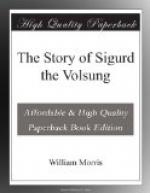But this arrangement of the world was only for a season. The gods themselves looked forward to a time of defeat and death, when Asgard should perish in flames and the world with it, and the sun and moon should be darkened, and they themselves should be slain. This great day was called Ragnarok, or sometimes the Twilight of the Gods. Then Loki would gather giants and monsters to a great battle against the gods, who would slay their enemies, but who would themselves fall in the struggle. The sea would drown the earth, the stars would fall, and all things would pass away.
This terrible fate the gods awaited with calm and cheerfulness, showing even greater courage than in their many deeds of war. They had to submit to this fate, for there were three beings even greater than they. These were the Norns, deciders of the fate of gods and men alike. They were three giant maidens who dwelt by a sacred, wisdom-giving fountain, and who controlled the lives of men, giving to each sickness and health, success and failure and death when they would. No man or god might escape what the Norns decreed for him.
Many stories of these gods, together with tales of famous men, were told among the northern peoples. These stories were passed on from one to another by word of mouth, till they grew much longer and fuller, and the happening of certain historical events helped to take them from country to country.
As we have seen, all the races of the North were warlike and eager for adventure, and so when trouble came upon them in their own homes, they readily took to the sea to plunder the coasts or to conquer other lands. Between 800 and 900 A.D., when the Danes were invading England, many were driven from Norway because they refused to submit to a king called Harold Fairhair, and when he pursued them to the Orkney and Faroe Islands they took refuge on the coasts of Iceland. There they settled, built themselves wooden houses, planted such crops as would grow in that bleak land, and founded a commonwealth. Little by little they left the old Viking life, and it lived only in their songs and stories.
They had come to Iceland with a vast stock of tales in poetry, which were related or sung by professional poets, called skalds, at all kinds of feasts and gatherings. The skalds arranged and improved the old stories, but they were not written down until about the time of our King Stephen, when some unknown writer collected them into one book called the Elder Edda. Very soon after this another book was written containing the same stories in prose and called the Younger or Prose Edda. In this way many of the old poems, and a great many stories containing much information about the religion which the people took with them to Iceland, have been preserved.
But it was from neither of the Eddas that William Morris took his story of Sigurd.
All through the period from 800 A.D. till about the time of Henry III. of England, the skalds had been re-telling many of the poetic stories in prose, and as the people grew more civilised, one tale after another was written down in its new form.




